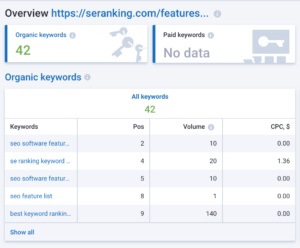What is keyword clustering? How to List Keywords for SEO
Disclosure: This post contains affiliate links for which we may receive a commission when you click on the link and purchase. We appreciate your support.
When it comes to SEO optimization for your content, keyword clustering plays an influential role in finding related keywords and helps your content rank higher on search engines.
Using the traditional method, it is time-consuming to group keywords on a spreadsheet and analyze each of them for search engine results.
Alternatively, digital content creators and bloggers can cluster keywords by using some incredible SEO keyword grouping tools like SE ranking, and Serpstat, to help them group keywords for SEO analysis, data data-driven, and it will save them a lot of time.
Based on my experience, I think it’s essential for beginners and digital marketers to first understand what a keyword cluster is, delve into the benefits of clustering Google keywords for content optimization, and learn how to group keyword clusters for better ranking and grow your website traffic.
Key Takeaway
Table of Contents
- Keyword clustering is an effective SEO strategy that helps you find similar keywords based on search intents.
- This SEO practice provides many benefits to your website in terms of increasing its online search ranking, building topical authority, and comprehensively covering a particular topic.
- Two ways to group keywords: use the SEO keyword software and the traditional way is using the spreadsheet to list keywords you want.
- I suggest using SEO keyword clustering tools as they save you time and resources for content creation.
What is a keyword cluster?
Keyword clustering is the SEO implementation for content marketing that groups similar keywords with similar meanings based on the search intent.
Basically, you can group related keywords by search intent (for marketing purposes) and then create content targeting those keyword-based search queries.
Here is a keyword clustering example: what is digital marketing, and meaning of digital marketing, both are similar keywords to the definition of digital marketing. Those keywords cater to users the real meaning of digital marketing for individuals and businesses.
The key reason why you should use cluster keywords is to increase the chance of ranking higher on search engines based on a variety of similar keywords, which indicates to Google that you have covered in-depth and valuable content for your audience.
Related: The 6+ Best Keyword Research Tools to Boost Site’s Online Visibility
The benefit of clustering keywords
So often, grouping keywords is an effective SEO practice that helps your content easily appear on search queries based on a large number of related keywords.
After finding a group of similar keywords, you can create comprehensive content that serves the audience’s needs and interests, in return, it will generate more organic traffic, boost your site ranking, and reach a wider audience.
The following are several advantages of keyword clustering:
Rank higher with related keywords
One of the biggest advantages of clustering keywords is that your content will have a higher chance of ranking for multiple keywords and generating more organic traffic.
As mentioned before, people will find your content if they search for a related keyword that has a similar meaning to the main keyword you set on your content.
Let’s explore the SEO keyword clustering of one of the website URLs on the tool for competitor analysis like Serpstat and identify how many similar keywords for one URL.

In particular, I pasted the SE ranking features page, and it shows that the content has around 42 keywords.
Most similar keywords are ranking high on the Google search, from position 2 to position 9. Based on the high keyword rankings of the page, the SE Ranking features page is in a position to generate a lot of organic traffic through search queries.
Provide in-depth coverage of content topic
By grouping similar keywords, you would be able to structure your content idea effectively so that particularly addresses the topic better and serves the interest of the audience.
In addition, keyword clustering helps you create related content to provide further information about a certain topic, this definitely helps to strengthen your site’s internal linking structure and deliver valuable content.
Improve topical authority
When you are done with keyword collection, you will delve into more detail about specific topics, and create highly rated content that provides comprehensive information on a particular subject.
For this, the audience may find your content helpful and give them broader knowledge to solve their current problem.
As a result, your website will increase its online visibility and rank higher on Google and Bing search engines if you continue to create content that provides solutions to common challenges.
How to list keywords Clustering for SEO
In fact, there are two main methods to create cluster keywords you may consider using:
- Using SEO optimization tools: This is the quick and easy way to group keyword clusters and find relevant keywords for your content. Several SEO tools you should use, like SE ranking, Serpstat, Semrush, etc.
- Using Spreadsheet: This is a traditional way of grouping similar keywords based on analyze them on search engine queries, and search intent. After that, they will list them together on the spreadsheet for creating future content.
The second method takes a lot of time and you could not be able to find any content gaps to serve audience needs.
Instead of spending hours grouping keywords, I will show you how to use the keyword clustering tool- Serpstat to find similar keywords that allow you to discover similar keywords in minutes.

On the Serpstat platform, select the ” keywords selection”, and enter the keyword you would like to rank for your content.
After you click enter, it will analyze and provide you a bunch of keywords that you can use to rank on search engines, based on keyword difficulty scores and search volumes.

To find semantic keywords, you click on the ” related keywords” that have similar meanings and help your content increase its search appearance on the internet using a bunch of cluster keywords.
I suggest collecting keywords with high search intents and not too high difficulty scores as it reduces the keyword ranking competition with other larger websites.
Further reading resources related to digital marketing and blogging tips:
6 Powerful Content Marketing Trends to Dominate Your Small Business Blog
3 Key Traffic Metrics Beginners Should Learn from Google Analytics Tools
Do-Not Ignore The Power of On-Page SEO: 7 Proven Tips To Search Engine Optimization
Don’t forget to share and Join us at Jns-millennial.com for more tips.

